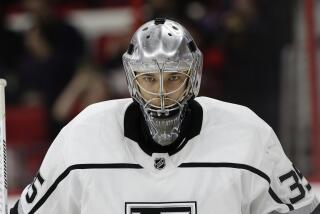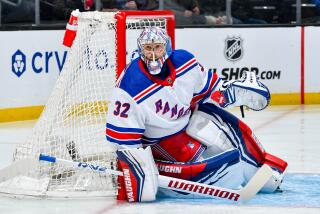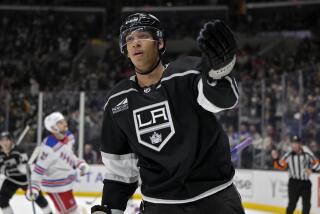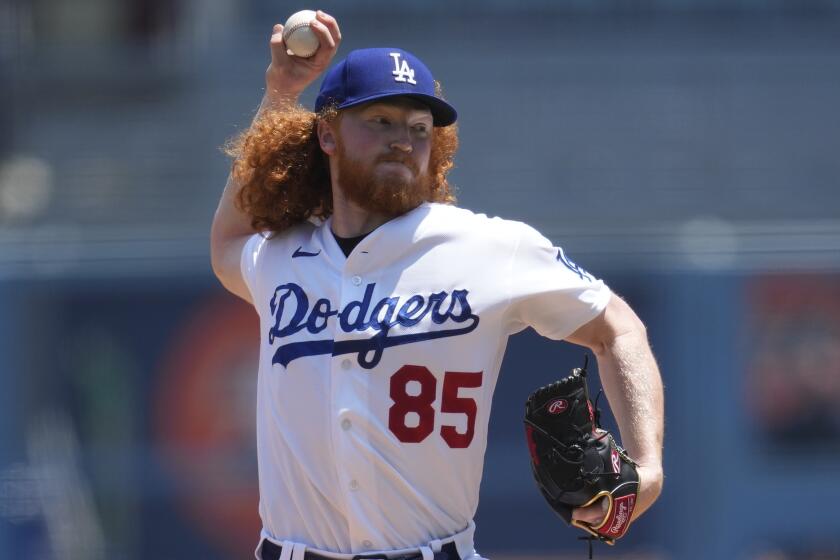Kings goalie Jonathan Quick joins ranks of star athletes
The moment felt perfect for crowning a new star on the Southern California sports scene.
The Kings had just won the Stanley Cup, the crowd inside Staples Center thundering, as goaltender Jonathan Quick skated to center ice to accept the most valuable player award.
Quick gave a wave, then abruptly wheeled around, handed the trophy to a league official and disappeared into a cluster of teammates.
“Obviously you still go about your day the same way you always have,” he said about his newly recognized prominence.
The 26-year-old Connecticut native has quietly taken his place among the likes of Magic Johnson and Kobe Bryant, Fernando Valenzuela and Orel Hershiser, athletes who became pop icons in a city known for manufacturing fame.
But Quick is a different sort of leading man.
This is a guy of few words who does his work behind the anonymity of a mask. He seems far more comfortable facing a vicious slap shot than a television camera. Which prompts the question: Is he ready for his close-up?
“You can tell from his interviews that he’s not an attention grabber,” teammate Colin Fraser said. “He likes to go about his business and play.”
Hockey is a lesser sport in this part of the world and perhaps only die-hard fans would recognize Quick’s boyish face on the street. Yet, as the Lakers and Clippers fell by the wayside in the NBA playoffs, as the streaking Dodgers cooled down for a few weeks, the goalie and his team took center stage.
With a distinctive style that had him crouching low, he scrambled back and forth like a spider on the ice, snagging pucks at all angles.
“He’s a little different from other goalies,” said Travis Zajac of the New Jersey Devils, the team that lost to the Kings in the Final.
Early in the season, the Kings struggled through an offensive slump and needed Quick to keep the score close each night. In the playoffs, he led all goalies by surrendering an average of 1.41 goals per game. He gave up three goals in only two games and had three shutouts.
Just as important, his soft-spoken work ethic came to embody a team that was short on marquee names but long on grit.
“You try to do your job every night,” he said. “Hopefully, more times than not, you’re able to do that.”
The hype that surrounded the Kings’ unexpected title run did not interest him much. During a recent news conference, he made it clear that he was paid to stop shots, not provide sound bites.
“Well, I don’t, to be honest, really enjoy it,” he said of the media attention. “When I think of the Final, I don’t think of being here in front of you guys.”
Team officials carefully restricted his time with reporters during the playoffs. He was usually brief — and occasionally curt — when answering questions. The people closest to him were not surprised.
“He was really just trying to focus,” said Jaclyn, his wife. “I know his job entails media, but he tries to pretend like it doesn’t.”
George Bazos, his agent, said, “You’ll have dinner with him and he will not talk about himself. I’ve known him for a long time and never once have I heard him say, ‘Boy, I’m playing well.’”
So this wasn’t like Bryant and Shaquille O’Neal with their outsized personalities — and the drama of their locker-room clashes — when they played together for the Lakers. It wasn’t like Valenzuela riding a cultural phenomenon at the intersection of the Dodgers and the city’s Latino roots.
Quick did not possess Magic’s smile or the pedigree of David Beckham, who arrived as an internationally famous soccer player and helped the Galaxy to a title.
Dodger great Sandy Koufax was also very media shy but he was easily recognized if caught on the street. But Quick, who plays 60 minutes wearing a mask, would blend in with the scenery.
Still, over the past weeks, it seemed possible that Los Angeles might embrace an understated hero.
Certainly his teammates loved him because when they made mistakes that led to goals for the other side, Quick never slammed his stick in disgust — as other goalies sometimes did — or pointed fingers after the game.
And fans could cheer for someone who, by all accounts, lived a simple family life, with no outlandish behavior or negative headlines shadowing him off the ice.
“He has the mentality of a hockey player,” Kings announcer Bob Miller said. “You don’t go out in public and beat your chest.”
Bazos said that he has already received “a lot of calls” from marketers interested in signing Quick to endorsement deals. Another longtime agent, Leonard Armato, said that athletes don’t need a lot of personality, just a recognizable persona.
That’s where humility and determination can pay off.
“The kid’s got to think about what he stands for,” said Armato, who previously represented O’Neal and now works for the New York-based Leverage Agency. “He should look for companies that complement him and can help build his name value.”
Quick was looser and warmer after Monday night’s clinching victory, holding his 2-year-old daughter, Madison, on the podium, letting a smile show through that scraggly playoff beard.
For a few minutes, he seemed to welcome the cameras and microphones.
“I think the attention the team’s going to get is great,” he said. “That’s something we have been looking for in this market for so long, to get the attention towards hockey.”
That doesn’t mean fans should expect to see Quick on billboards all over town or making public appearances at the mall.
His agent said he will be choosy about endorsements, that he won’t become a pitchman overnight. Nor will he suddenly develop a knack for talking about himself.
After the last few weeks, maybe he doesn’t need to.
twitter.com/LATimesWharton
More to Read
Go beyond the scoreboard
Get the latest on L.A.'s teams in the daily Sports Report newsletter.
You may occasionally receive promotional content from the Los Angeles Times.











